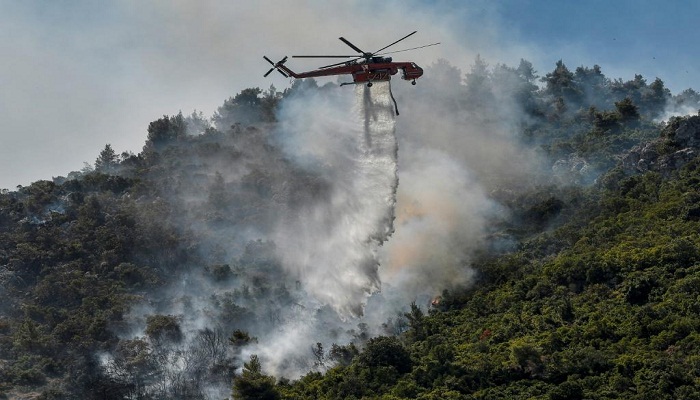Evia island engulfed in flames as Greek wildfires cut a path of destruction for sixth day

Pillars of smoke and ash that turned the sky orange have blocked out the sun above Greece's second-largest island as a days-old wildfire devours pristine forests and encroaches on villages, triggering more evacuation alerts.
The fire on Evia began on August 3 and has cut across the popular summer destination from coast to coast as it burned out of control.
Scores of homes and businesses have been destroyed and thousands of residents and tourists have fled, many escaping the flames via flotillas that even operated in the dark of night.
The blaze is the most severe of dozens that broke out in the wake of Greece's most protracted heatwave in three decades, which sent temperatures soaring to 45 degrees Celsius for days, creating bone-dry conditions.
He was one of several local officials and residents who took to Greek TV networks to appeal for more firefighting help, particularly from water-dropping planes and helicopters.
In dramatic scenes on Sunday afternoon, fast-moving flames encroached on the seaside village of Pefki on the island's northern coast, burning trees on the fringes and entering the houses' yards.
At least one house was on fire.
Panicked residents raced with water tanks, hoses and branches in a seemingly futile attempt to extinguish the flames.
A ferry, coast guard patrol boats, navy vessels and other boats were on standby to evacuate residents.
Around 350 people had boarded the ferry even before the flames reached the village, the coast guard said, while 23 others were rescued from other beaches in northern Evia.
Civil Protection chief Nikos Hardalias said the conditions there were particularly tough for the water-bombing planes and helicopters, whose pilots faced "great danger" with limited visibility and air turbulence.
But many have decried government efforts, citing what they saw as a lack of firefighting forces or planes or delays in their arrival.
"It was unfair and many people have lost their property and their livelihoods," Ms Tsatou said.
The wildfires have stretched Greece's firefighting capabilities to the limit, and the government has appealed for help from abroad.
More than 20 countries have responded, sending planes, helicopters, vehicles and manpower.
Three more major fires were also burning throughout Sunday in Greece's southern Peloponnese region, while another broke out Sunday afternoon on the southern island of Crete.
Another massive fire that ravaged forests, homes and businesses on the northern fringes of the Greek capital appeared to be on the wane.
The causes of the fires are under investigation.
Three people were arrested Friday on suspicion of starting blazes, in two cases intentionally.
Greek and European officials have also blamed climate change for the large number of fires in southern Europe this summer, from Italy to the Balkans, Greece and Turkey.
Source: www.daily-sun.com
